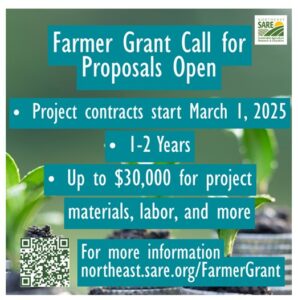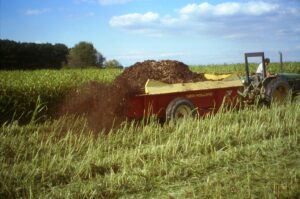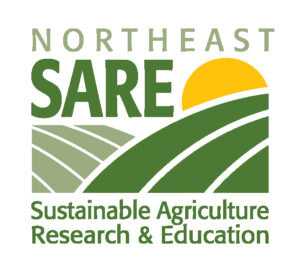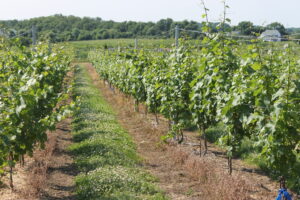
Farmers in the Northeast can apply for up to $30,000 in funding for sustainable agriculture projects starting in 2025. These projects can range from experiments to on-farm events and demonstrations or other educational activities.
The Call for 2025 Northeast Sustainable Agriculture Research and Education (SARE) Farmer Grants is now available. Approximately $850,000 has been allocated to fund projects. Awards of up to $30,000 are available. Proposals are due no later than 5:00 p.m. EST on November 12,2024.
Q&A Sessions are taking place alternating Tuesdays and Wednesdays in October. Register once to attend any of the sessions.
Sessions will take place on: Oct 8, 16, 22, 30. from 12 to 1 EST
To register see https://us02web.zoom.us/meeting/register/tZAlcO-qrjguGtSNrOemAOP7pZWbUCcl5GqN#/registration
To see the call for proposals https://www.sare.org/wp-content/uploads/Northeast-SARE-Farmer-Grant-Call-for-Proposals.pdf
To learn more about the SARE Farmer Grants https://northeast.sare.org/grants/get-a-grant/farmer-grant-program
For More Information contact USDA NESARE or your State Coordinator: Stephen Komar at komar@njaes.rutgers.edu
 Multiple Northeast SARE (Sustainable Agriculture Research and Education) grant recipient Tommye Lou Rafes, of T.L. Fruits and Vegetables in West Virginia, is sharing her experiences to help other farmers experiment with new ideas through the Farmer Grant program.
Multiple Northeast SARE (Sustainable Agriculture Research and Education) grant recipient Tommye Lou Rafes, of T.L. Fruits and Vegetables in West Virginia, is sharing her experiences to help other farmers experiment with new ideas through the Farmer Grant program.
 ave an idea you would like to try on your farm that is related to sustainable agriculture?
ave an idea you would like to try on your farm that is related to sustainable agriculture? 